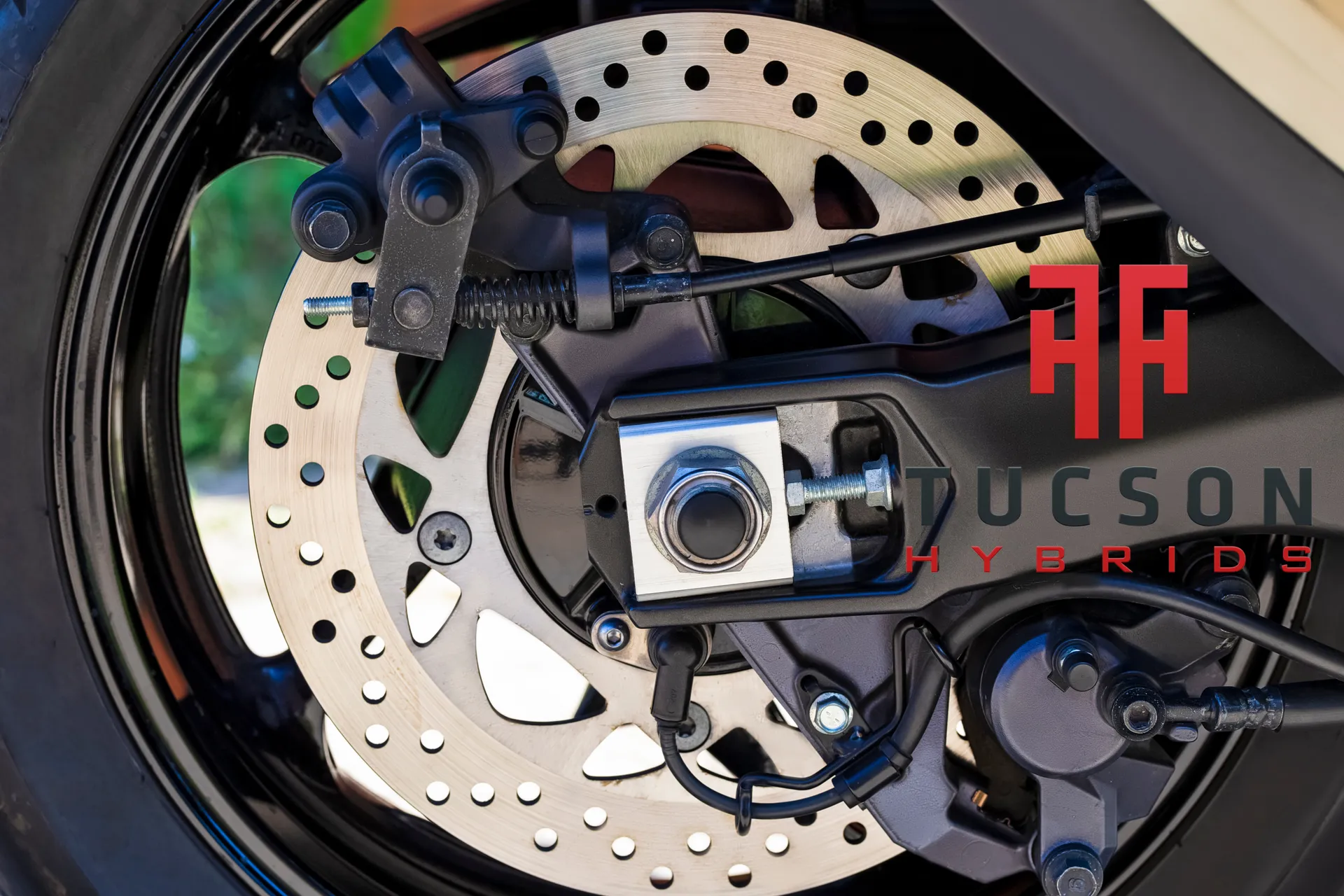26 Jun Do You Need an ABS Wheel Sensor Replacement?

Do You Need an ABS Wheel Sensor Replacement?
When it comes to vehicle safety, few systems are as crucial as your brakes. Most modern vehicles, especially hybrid and electric vehicles (EVs), are equipped with an Anti-Lock Braking System (ABS). This system prevents wheel lockup during sudden braking, helping you maintain steering control and avoid dangerous skids. But what enables the ABS to perform so effectively? One critical component is the ABS wheel speed sensor, sometimes simply referred to as the ABS sensor.
Understanding how this sensor works—and recognizing when it’s failing—can help you avoid costly repairs and keep your vehicle performing at its best. Let’s take a closer look at what the ABS sensor does, why it’s important, and how Tucson Hybrids can help if you need a replacement.
What is an ABS Wheel Sensor?
The ABS sensor is a small but powerful component that plays a vital role in your car’s braking and traction systems. It continuously monitors the rotational speed of each wheel and sends that data to your vehicle’s Electronic Control Unit (ECU). If the ECU detects a sudden deceleration or potential lockup in one or more wheels, it adjusts the brake pressure to maintain traction.
In hybrid and electric vehicles, ABS sensors are even more essential. These vehicles rely on a combination of regenerative braking (which converts kinetic energy into battery charge) and traditional braking. The ABS sensor helps synchronize these systems for smoother, more efficient deceleration. It also interacts with electronic stability control and traction control systems, which are integral to safety on modern hybrid/EV platforms.
How ABS Sensors Work
Each ABS sensor is mounted near a tone ring (or reluctor ring) attached to the wheel or axle. As the wheel spins, the tone ring passes by the sensor, generating a signal that corresponds to the wheel’s speed. This signal is sent to the ECU, which constantly monitors for discrepancies between each wheel’s rotation speed. If one wheel is spinning significantly slower than the others during braking, the ABS system temporarily reduces brake pressure to that wheel to prevent skidding.
ABS sensors can be either active (with their own power supply) or passive (relying on magnetic fields). Hybrid and EV systems typically use active sensors for greater precision and integration with other systems like regenerative braking.
Common Symptoms of a Faulty ABS Sensor
ABS sensors, like any electronic component, can wear out or become damaged due to dirt, corrosion, road debris, or exposure to moisture. When a sensor fails, you’ll likely notice some of the following warning signs:
1. ABS Warning Light
The most obvious indicator is the ABS light turning on in your dashboard. While this can indicate a range of problems in the braking system, a faulty ABS sensor is one of the most common causes. In some vehicles, the Check Engine Light or Traction Control Light may also appear.
2. Increased Braking Distance or Unresponsive Brakes
If your ABS system is compromised, your vehicle may take longer to come to a complete stop during emergency braking. This is especially dangerous in wet, snowy, or icy conditions where wheel lockup is more likely.
3. Speedometer Malfunctions
In some vehicles, especially hybrids and EVs, the ABS wheel speed sensors feed data to the speedometer. If you’re seeing erratic speedometer readings or a complete failure of the display, it could be due to a malfunctioning sensor.
4. Traction Control or Stability Control Issues
Many stability control systems rely on ABS sensors to detect wheel slippage and apply corrective measures. If the sensor fails, you might notice the Traction Control System (TCS) turning off or behaving inconsistently.
5. Grinding or Unusual Noises
A grinding noise near the wheels could mean a physical issue with the sensor, tone ring, or related components like brake rotors or wheel bearings. This should be inspected immediately to avoid further damage.
Why You Shouldn’t Ignore ABS Sensor Issues
Your ABS system is designed to protect you in high-stress driving situations. Without a working sensor, the system can’t function properly, putting you—and others on the road—at serious risk.
In hybrid and EV vehicles, ignoring a bad ABS sensor can also impact the regenerative braking system, which not only helps recharge your battery but also reduces wear on your brake pads and rotors. When that system fails to activate, it increases the load on traditional brakes and reduces overall energy efficiency.
Continuing to drive with a malfunctioning ABS sensor can also:
- Trigger additional fault codes or damage other vehicle control modules
- Shorten the lifespan of your brake components
- Fail emissions or safety inspections (in some states)
Why Choose Tucson Hybrids for Your ABS Sensor Replacement?
At Tucson Hybrids, we specialize in servicing hybrid and electric vehicles, which means we understand the unique challenges of ABS and brake systems in these advanced cars. Unlike a general mechanic, our shop is equipped with OEM-grade diagnostic tools designed to read ABS-specific fault codes from hybrid and EV vehicles.
Here’s what makes Tucson Hybrids the right choice for your ABS sensor service:
- ✅ Expertise in Hybrids and EVs: Our technicians are trained specifically in the complex braking systems of hybrid and electric models.
- ✅ Advanced Diagnostics: We use state-of-the-art tools like multimeters, scan tools, and oscilloscopes to test signal output, voltage, and resistance in ABS sensors.
- ✅ Thorough Inspection: Before replacing any parts, we perform a full road test and sensor inspection to verify the root cause of the issue.
- ✅ OEM and High-Quality Parts: We only use factory-grade or better ABS wheel sensors that meet your vehicle’s original specifications.
- ✅ Nationwide Warranty & TechNet Partner: All repairs are backed by a warranty, giving you peace of mind on every mile.
We also know that our customers value trust and transparency. That’s why we provide detailed explanations of every repair we recommend and offer competitive pricing for ABS sensor diagnostics and replacements.
When to Replace an ABS Sensor
ABS sensors don’t need regular replacement like oil or brake pads, but they should be inspected:
- Whenever you get an ABS warning light
- After wheel bearing or axle work
- When braking behavior changes noticeably
- During a full brake system inspection, especially before long trips
If your ABS sensor has been damaged due to corrosion, physical impact, or electrical failure, replacement is usually straightforward and cost-effective—especially when compared to the risk of losing braking control.
Schedule Your ABS Sensor Replacement with Tucson Hybrids Today
If your ABS warning light is on or you’ve noticed braking issues, don’t wait. Let the specialists at Tucson Hybrids inspect your vehicle and get your ABS system back to full performance. We offer fast turnaround times, reliable parts, and exceptional customer care, all tailored to hybrid and EV owners.
Whether your vehicle needs a front or rear ABS wheel speed sensor, or you simply want a second opinion on a warning light, we’re here to help. We’ll get you back on the road safely—with full confidence in your brakes.
📞 Call us today at 520-214-5551
📍 Visit our shop in Tucson, AZ
💻 Book an appointment online anytime
🚗 Ask about our student and referral discounts!
Tucson Hybrids – Your Trusted Hybrid & EV Auto Repair Shop.
Where safety, quality, and long-term customer relationships come first.


No Comments